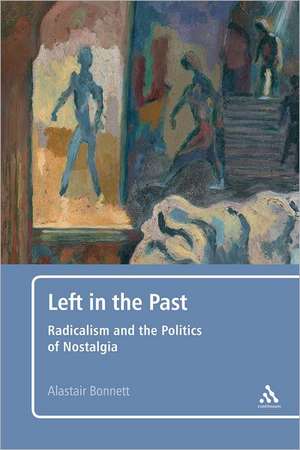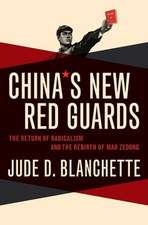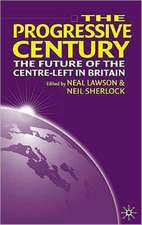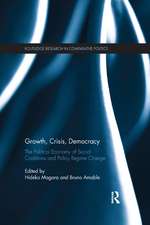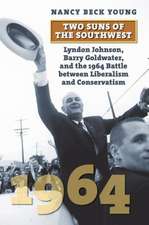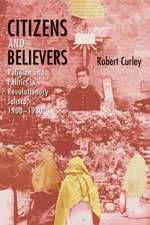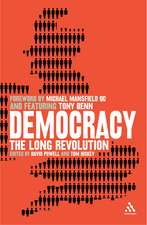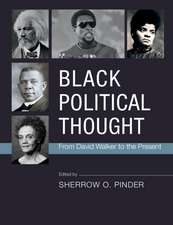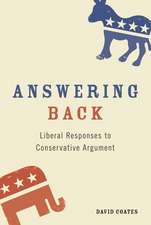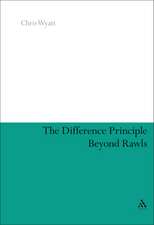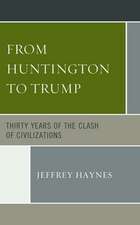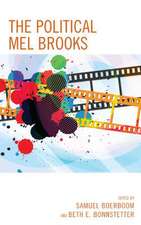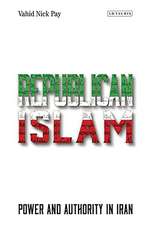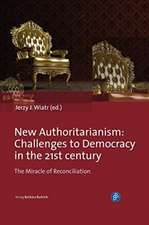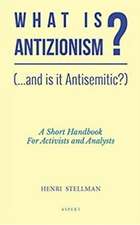Left in the Past: Radicalism and the Politics of Nostalgia
Autor Professor Alastair Bonnetten Limba Engleză Paperback – 7 iul 2010
Preț: 184.14 lei
Preț vechi: 214.52 lei
-14% Nou
Puncte Express: 276
Preț estimativ în valută:
35.24€ • 36.09$ • 29.31£
35.24€ • 36.09$ • 29.31£
Carte tipărită la comandă
Livrare economică 19 martie-02 aprilie
Preluare comenzi: 021 569.72.76
Specificații
ISBN-13: 9780826430076
ISBN-10: 0826430074
Pagini: 208
Dimensiuni: 152 x 226 x 15 mm
Greutate: 0.3 kg
Editura: Bloomsbury Publishing
Colecția Continuum
Locul publicării:New York, United States
ISBN-10: 0826430074
Pagini: 208
Dimensiuni: 152 x 226 x 15 mm
Greutate: 0.3 kg
Editura: Bloomsbury Publishing
Colecția Continuum
Locul publicării:New York, United States
Caracteristici
Multidisciplinary text. Main market is Poltical Theory, but can also reach history and cultural studies
Cuprins
Introduction
The Dilemmas of Radical Nostalgia
Acknowledging Nostalgia: Four Provocations
Six Windows onto Radical Nostalgia
Part One
Chapter One: Nostalgia and the Left: Denial, Danger and Doubt
Introduction
Nostalgia as the Modern Dilemma
The 'ruthless criticism of all that exists'
Radical Nostalgia
'We have lost something': The End of Utopia
Nostalgia's Uncertain Return
Conclusion
Chapter Two: Nostalgia in and against English Socialist History, 1775-1894
Introduction
The Politics of Loss in English Socialist History
From Poorman's Advocate to Proletarian: Thomas Spence and Radical Tradition
William Morris: Nostalgia in an Age of Progress
Robert Blatchford: The New Life and Old Traditions of Socialist Fellowship
Conclusion
Part Two
Chapter Three: Worlds We Have Lost: Nostalgia in Anti-Colonialism and Postcolonialism
Introduction
Anti-Colonial Nostalgia: Roots Against Empire
Postcolonial Nostalgias: Yearning for Resistance
Conclusion
Chapter Four: The Melancholia of Cosmopolis
Introduction
Cosmopolitan Attachments
Renewing resistance: Nostalgia and anti-nostalgia in British radical anti-racism
Nostalgia Strikes Back: Paul Gilroy's After Empire
Conclusion: Sharing Loss
Part Three
Chapter Five: Yearning at the Extremes: Situationist Nostalgia
Introduction
The Spectacle as Loss
'Whoever Sees the Banks of the Seine Sees Our Grief': Situationist Nostalgia for Place
Conclusions and New Departures
Chapter Six: The Psychogeography of Loss
Introduction
Purgatory and Redemption around the M25: The Radical
Nostalgia of Iain Sinclair
adical Re-enchantments: Magic, Preservationism and
Nostalgia in Revolutionary Psychogeography
Conclusion
Conclusion: Acknowledging Nostalgia
References
Index
The Dilemmas of Radical Nostalgia
Acknowledging Nostalgia: Four Provocations
Six Windows onto Radical Nostalgia
Part One
Chapter One: Nostalgia and the Left: Denial, Danger and Doubt
Introduction
Nostalgia as the Modern Dilemma
The 'ruthless criticism of all that exists'
Radical Nostalgia
'We have lost something': The End of Utopia
Nostalgia's Uncertain Return
Conclusion
Chapter Two: Nostalgia in and against English Socialist History, 1775-1894
Introduction
The Politics of Loss in English Socialist History
From Poorman's Advocate to Proletarian: Thomas Spence and Radical Tradition
William Morris: Nostalgia in an Age of Progress
Robert Blatchford: The New Life and Old Traditions of Socialist Fellowship
Conclusion
Part Two
Chapter Three: Worlds We Have Lost: Nostalgia in Anti-Colonialism and Postcolonialism
Introduction
Anti-Colonial Nostalgia: Roots Against Empire
Postcolonial Nostalgias: Yearning for Resistance
Conclusion
Chapter Four: The Melancholia of Cosmopolis
Introduction
Cosmopolitan Attachments
Renewing resistance: Nostalgia and anti-nostalgia in British radical anti-racism
Nostalgia Strikes Back: Paul Gilroy's After Empire
Conclusion: Sharing Loss
Part Three
Chapter Five: Yearning at the Extremes: Situationist Nostalgia
Introduction
The Spectacle as Loss
'Whoever Sees the Banks of the Seine Sees Our Grief': Situationist Nostalgia for Place
Conclusions and New Departures
Chapter Six: The Psychogeography of Loss
Introduction
Purgatory and Redemption around the M25: The Radical
Nostalgia of Iain Sinclair
adical Re-enchantments: Magic, Preservationism and
Nostalgia in Revolutionary Psychogeography
Conclusion
Conclusion: Acknowledging Nostalgia
References
Index
Recenzii
"Alastair Bonnett persuades us that the left can come to terms with nostalgia, because nostalgia-if the left did but realize it-is both a fact and an underutilized quality of leftist thought, and to prove it, Left in the Past conspires an unexpected rendezvous between early socialism, post-colonialism, and situationism. Unforeseen too is how this examination of nostalgia sheds new light on its opponent, modernity, placing the two rivals for the hearts and minds of the left in a truly welcome exchange. The book's novel readings of renowned cultural theories on the one hand, and exposés of arcane psycogeography on the other, will intrigue scholars, activists and students alike in virtually any area of politics, the arts, the humanities and social sciences. Bonnett writes with the humanity of someone who has thought through the contradictions he has felt within himself and which he wants now to share with others. And in a delicious irony, his findings are presented clearly and unsentimentally." --Simon Sadler, Professor of Architectural and Urban History, University of California, Davis
"Alastair Bonnett of Newcastle University in a brilliant new book, 'Left in the Past: Radicalism and the Politics of Nostalgia' writes that 'throughout the last century nostalgia was cast as the antithesis of radicalism. Emotions of yearning and loss were portrayed as embarrassing defects on the bright body of movement associated with the new and the youthful'. --Jon Cruddas, Member of Parliament (UK)
Praised by Labour MP Jon Cruddas in a lecture delivered in Liverpool March (UK) ''Alastair Bonnett of Newcastle University in a brilliant new book, 'Left in the Past: Radicalism and the Politics of Nostalgia' writes that 'throughout the last century nostalgia was cast as the antithesis of radicalism. Emotions of yearning and loss were portrayed as embarrassing defects on the bright body of movement associated with the new and the youthful'.''
Bonnett's brilliant book- which, quite simply, must be read by anyone wanting not only a richer understanding of the patriotic, conservative and radical nature of the English left's past, but a guide and contour to current debates- forces us to refine our attitude to nostalgia as a human impulse and deeply constructive trait.
Ambitious and wide-ranging . [A] scholarly and stimulating work, which makes a valuable and much-needed contribution to the scholarship on nostalgia, modernity and left politics.
[My] academic interests have been stimulated and my learning enhanced through the reading of this book. I highly recommend Left in the Past to anyone interested in exploring the history of radicalism and/or the politics of nostalgia.
"Alastair Bonnett of Newcastle University in a brilliant new book, 'Left in the Past: Radicalism and the Politics of Nostalgia' writes that 'throughout the last century nostalgia was cast as the antithesis of radicalism. Emotions of yearning and loss were portrayed as embarrassing defects on the bright body of movement associated with the new and the youthful'. --Jon Cruddas, Member of Parliament (UK)
Praised by Labour MP Jon Cruddas in a lecture delivered in Liverpool March (UK) ''Alastair Bonnett of Newcastle University in a brilliant new book, 'Left in the Past: Radicalism and the Politics of Nostalgia' writes that 'throughout the last century nostalgia was cast as the antithesis of radicalism. Emotions of yearning and loss were portrayed as embarrassing defects on the bright body of movement associated with the new and the youthful'.''
Bonnett's brilliant book- which, quite simply, must be read by anyone wanting not only a richer understanding of the patriotic, conservative and radical nature of the English left's past, but a guide and contour to current debates- forces us to refine our attitude to nostalgia as a human impulse and deeply constructive trait.
Ambitious and wide-ranging . [A] scholarly and stimulating work, which makes a valuable and much-needed contribution to the scholarship on nostalgia, modernity and left politics.
[My] academic interests have been stimulated and my learning enhanced through the reading of this book. I highly recommend Left in the Past to anyone interested in exploring the history of radicalism and/or the politics of nostalgia.
